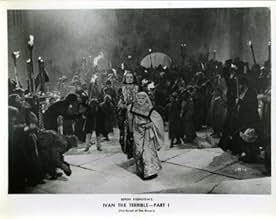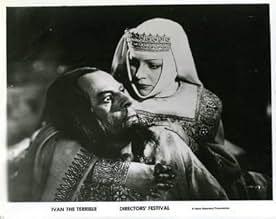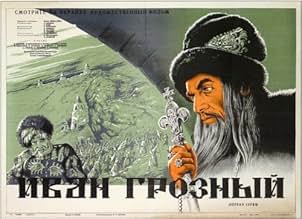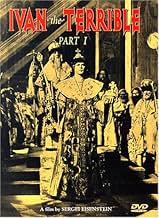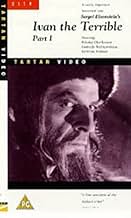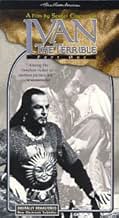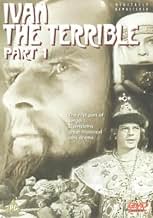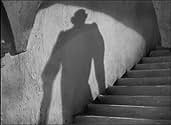NOTE IMDb
7,7/10
11 k
MA NOTE
Au début de son règne, Ivan le Terrible doit faire face à la trahison de l'aristocratie et même de ses amis les plus proches alors qu'il cherche à unir le peuple russe.Au début de son règne, Ivan le Terrible doit faire face à la trahison de l'aristocratie et même de ses amis les plus proches alors qu'il cherche à unir le peuple russe.Au début de son règne, Ivan le Terrible doit faire face à la trahison de l'aristocratie et même de ses amis les plus proches alors qu'il cherche à unir le peuple russe.
- Réalisation
- Scénario
- Casting principal
- Récompenses
- 2 victoires et 1 nomination au total
Aleksandr Rumnev
- The Stranger
- (as Aleksandr Rumnyov)
Avis à la une
This first part of Eisenstein's filming of the life and times of "Ivan the Terrible" has lots of drama, very good characterizations, fascinating settings, and plenty of action. Nikolai Cherkasov is completely convincing in the lead role, and the rest of the cast complements him well (especially Serafima Birman as his crafty aunt). This period in history is quite interesting and significant in itself, and Eisenstein presents everything in a fashion that is thoughtful and also enjoyable to watch.
Ivan combined a remorseless personal ambition with a genuine desire to strengthen and protect Russia, while the boyars, who opposed him, acted from motives that were almost exclusively personal. Combined with the plans of Russia's neighbors, all of this makes for a complex and interesting series of events, and the movie does a good job of presenting both the events and the possibilities, both on the surface and behind the scenes. Not the least of the reasons why it works so well are the settings. They are always interesting, believable, and atmospheric - and the indoor settings are especially so.
Part One is praiseworthy both in its own right and as the foundation for the outstanding sequel. Eisenstein generally excelled at depicting important periods in his country's history, and his series on Ivan's critical reign demonstrates all of his many skills. His attention to detail (of which there are too many examples even to try to list) and his appreciation for the overall picture make this a memorable film of high quality.
Ivan combined a remorseless personal ambition with a genuine desire to strengthen and protect Russia, while the boyars, who opposed him, acted from motives that were almost exclusively personal. Combined with the plans of Russia's neighbors, all of this makes for a complex and interesting series of events, and the movie does a good job of presenting both the events and the possibilities, both on the surface and behind the scenes. Not the least of the reasons why it works so well are the settings. They are always interesting, believable, and atmospheric - and the indoor settings are especially so.
Part One is praiseworthy both in its own right and as the foundation for the outstanding sequel. Eisenstein generally excelled at depicting important periods in his country's history, and his series on Ivan's critical reign demonstrates all of his many skills. His attention to detail (of which there are too many examples even to try to list) and his appreciation for the overall picture make this a memorable film of high quality.
On a backdrop of intrigue, murder and betrayal, Prince Ivan conquers enemies and becomes the first Czar of all Russia, at the cost of his own soul.
Eisenstein's name and reputation loom over film history in such a forbidding way that you would be forgiven for deeming his work impenetrable by modern standards, yet while his silent epics are so seminal as to be hard to evaluate objectively, his late talking films can be hugely rewarding viewing, even to more casual film-goers. As a summation of his artistic evolution and scholarship, they are no less treasurable or significant than Battleship Potemkin, yet they have a more compelling story to tell.
Ivan The Terrible was to be a trilogy, of which only parts 1 and 2 were completed before their creator fell into disfavor with Stalin. Yet parts 1 and 2 are rich enough that together they form a perfect story ending on a chilling note. On to part 1 then...
Part 1 tells the story of Prince Ivan from young hopeful to warlord and recluse, before he truly accepts his calling. It is an incredibly romanticized tale, and formally, a relic of a time long gone, one that perhaps only ever existed in Eisenstein's mind. His was a unique visual sensibility and the Ivan films are full of layered, meticulously composed and designed shots: characters scurry like rodents through claustrophobic tunnels, the look is at times so expressionistic as to evoke where The Cabinet of Dr Caligari might have evolved. It is both familiar and horribly alien, like the nightmare it later confirms itself as in part 2.
Given the conflicting emotions evoked - heroism with oppression, epic scale but suffocating formalism - you would do well to brace yourself through this one and remember that only once you've seen both parts will it all make terrible sense. Only then will you appreciate the unique genius at work here.
One cannot distinguish between the two Ivans for one cannot exist without the other, and together, they form one of the best films ever made.
Eisenstein's name and reputation loom over film history in such a forbidding way that you would be forgiven for deeming his work impenetrable by modern standards, yet while his silent epics are so seminal as to be hard to evaluate objectively, his late talking films can be hugely rewarding viewing, even to more casual film-goers. As a summation of his artistic evolution and scholarship, they are no less treasurable or significant than Battleship Potemkin, yet they have a more compelling story to tell.
Ivan The Terrible was to be a trilogy, of which only parts 1 and 2 were completed before their creator fell into disfavor with Stalin. Yet parts 1 and 2 are rich enough that together they form a perfect story ending on a chilling note. On to part 1 then...
Part 1 tells the story of Prince Ivan from young hopeful to warlord and recluse, before he truly accepts his calling. It is an incredibly romanticized tale, and formally, a relic of a time long gone, one that perhaps only ever existed in Eisenstein's mind. His was a unique visual sensibility and the Ivan films are full of layered, meticulously composed and designed shots: characters scurry like rodents through claustrophobic tunnels, the look is at times so expressionistic as to evoke where The Cabinet of Dr Caligari might have evolved. It is both familiar and horribly alien, like the nightmare it later confirms itself as in part 2.
Given the conflicting emotions evoked - heroism with oppression, epic scale but suffocating formalism - you would do well to brace yourself through this one and remember that only once you've seen both parts will it all make terrible sense. Only then will you appreciate the unique genius at work here.
One cannot distinguish between the two Ivans for one cannot exist without the other, and together, they form one of the best films ever made.
Eisenstein's 'Ivan the Terrible' once featured in an American book of the 50 worst films of all times, along with 'Attack of the Killer Tomatoes' and 'Plan 9 from Outer Space'.
But as true cinemaniacs acknowledge, 'Ivan', along with 'Ivan the Terrible Part 2', is one of the great masterpieces of the screen. Its style is highly artificial, the acting operatic with no condescension to realism. But the viewer is swept away by the stylised pacing, the way each scene is so precisely plotted and designed -- each camera shot becomes a precious ornamented jewel. The film is, like the earlier 'Alexander Nevsky', as much a vehicle for the great Russian composer Prokofiev as for Eisenstein -- the two attained a cinematic union of image and music which has been rarely equaled since.
The two 'Image' Region 1 DVDs for Ivan Parts One and Two are spartan affairs, with no added features. The orchestral soundtrack is definitely low-fi. But the print sources must have been excellent -- the black-and-white prints are as lustrous as the finest modern movie, the images sharp and clear. And when the film suddenly switches from black-and-white and erupts in colour, the colour is dense and brilliant, unlike the bleached and pale versions usually doing the art-cinema rounds.
How fantastic to have available such treasures on DVD, in such pristine condition! Buy! Buy! Buy!
But as true cinemaniacs acknowledge, 'Ivan', along with 'Ivan the Terrible Part 2', is one of the great masterpieces of the screen. Its style is highly artificial, the acting operatic with no condescension to realism. But the viewer is swept away by the stylised pacing, the way each scene is so precisely plotted and designed -- each camera shot becomes a precious ornamented jewel. The film is, like the earlier 'Alexander Nevsky', as much a vehicle for the great Russian composer Prokofiev as for Eisenstein -- the two attained a cinematic union of image and music which has been rarely equaled since.
The two 'Image' Region 1 DVDs for Ivan Parts One and Two are spartan affairs, with no added features. The orchestral soundtrack is definitely low-fi. But the print sources must have been excellent -- the black-and-white prints are as lustrous as the finest modern movie, the images sharp and clear. And when the film suddenly switches from black-and-white and erupts in colour, the colour is dense and brilliant, unlike the bleached and pale versions usually doing the art-cinema rounds.
How fantastic to have available such treasures on DVD, in such pristine condition! Buy! Buy! Buy!
10zetes
Before I new much about him, when I used to see the box for Alexander Nevsky on the Foreign shelf at my local video store, I always misread Eisenstein's name, transforming it into Einstein. Well, Einstein suits him just as well, for what Albert Einstein was to science Sergei Eisenstein is to the cinema. Witness Battleship Potemkin, possibly the most rousing film ever made. Today, nearly 80 years after it was made, it still has the power to inspire revolution. Its amazing montage editing style may have died with silent cinema (although there are at least two directors today who are somewhat similar: Shinya Tsukamoto and Darren Aranofsky), but it will never be forgotten.
When Eisenstein moved to sound, he realized that rapid montage would not work in the new medium. He adapted his style, perfecting a new one. Alexander Nevsky and the two Ivan the Terrible films come off to many people as stale historical epics. To me, they come off as the very peak of that genre. Usually I do find historical epics stuffy, but the direction, acting, writing, cinematography, and music of these three films are exquisite, so far beyond anything that I've ever seen that these films stir me nearly as much as Potemkin does.
Ivan the Terrible I is a bit confusing in its plot to begin with, but you have to stick with it. First off, there are many, many characters. A great many are not mentioned by name, and most of the rest are only named on rare occasions. But Eisenstein familiarizes us with the characters' faces. These faces are perfectly chosen and lighted spectacularly. The light is so harsh that every crag in a person's face is clear, and noses cast foreboding shadows. The way time progresses in this film is without much warning, and one problem I encountered was identifying Ivan himself. I did not catch on at first when the first sequence ended and the second sequence began, and Ivan, in the second sequence, has a beard. Once you realize that, though, you're home free. That beard serves as a great identifier throughout the film (and is used in many ways by Eisenstein).
I was expecting to like this film, but I found myself obsessed with this utter masterpiece. 10/10
When Eisenstein moved to sound, he realized that rapid montage would not work in the new medium. He adapted his style, perfecting a new one. Alexander Nevsky and the two Ivan the Terrible films come off to many people as stale historical epics. To me, they come off as the very peak of that genre. Usually I do find historical epics stuffy, but the direction, acting, writing, cinematography, and music of these three films are exquisite, so far beyond anything that I've ever seen that these films stir me nearly as much as Potemkin does.
Ivan the Terrible I is a bit confusing in its plot to begin with, but you have to stick with it. First off, there are many, many characters. A great many are not mentioned by name, and most of the rest are only named on rare occasions. But Eisenstein familiarizes us with the characters' faces. These faces are perfectly chosen and lighted spectacularly. The light is so harsh that every crag in a person's face is clear, and noses cast foreboding shadows. The way time progresses in this film is without much warning, and one problem I encountered was identifying Ivan himself. I did not catch on at first when the first sequence ended and the second sequence began, and Ivan, in the second sequence, has a beard. Once you realize that, though, you're home free. That beard serves as a great identifier throughout the film (and is used in many ways by Eisenstein).
I was expecting to like this film, but I found myself obsessed with this utter masterpiece. 10/10
Ivan the Terrible, Parts One and Two are films when combined) are in the top ten films of all time, and are of enormous genius, but because of this are not easy to digest. The story of the tortured Ivan the Terrible, first Czar of Russia, from boyhood to near the end of his czarhood, it was filmed with extravagated acting, and each scene having multiple symbolic interpretations. For example, all the main characters or groups of characters are portrayed with the characteristics of animals, Ivan the Terrible being a bird. The cinematography is brilliant, and strangely beautiful, relying on parallels, and close ups of the characters (this is among the first films to have this technique, now one of the most common cinematography techniques). Because this film is such a classic, it will make watchers review it, and think on the film itself. As such, it is not "light" watching. It is most definitely one of the greatest films of all time, and is worth the time without question. Do not be held back by the black and white or that it is in Russian. Also, watch both Part One, and Part Two, they were meant to work off each other. The DVD contains what remains of the incomplete Part Three, which the director Sergei Ensenstein did not finish. When told by phone that Stalin would not allow for Part Two to be distributed in Russia and be vaulted due to it's anti-Communistic implications, Ensenstien hung up the phone, and promptly died by heart attack, leaving a trilogy without its ending.
Le saviez-vous
- AnecdotesTook over 3 years to make.
- GaffesAfter Anastasia's death, when discussing the Livonian war the "only" son of the Czar is mentioned. However at the time Ivan had two sons, Feodor, who became Czar Feodor I of Russia, and also Tsarevich Ivan Ivanovich.
- Citations
Czar Ivan IV: Those who tore down the bells without Czar's permission, those by Czar's command get torn down the heads for not too long.
- Crédits fousAll the credits are showed in front of a fire smoke.
- ConnexionsEdited into Histoire(s) du cinéma: Une histoire seule (1989)
Meilleurs choix
Connectez-vous pour évaluer et suivre la liste de favoris afin de recevoir des recommandations personnalisées
Détails
Box-office
- Montant brut mondial
- 12 196 $US
- Durée
- 1h 43min(103 min)
- Couleur
- Mixage
- Rapport de forme
- 1.37 : 1
Contribuer à cette page
Suggérer une modification ou ajouter du contenu manquant


